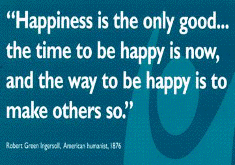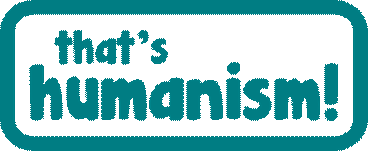
|
HUMANISM |



|
North London Group |

|
What is Humanism? Humanism is an approach to life based on reason and our common humanity, recognising that moral values are properly founded on human nature and experience alone. It is a progressive philosophy which affirms our ability and responsibility to lead ethical lives of personal fulfilment that aspire to the greater good of humanity. Who are the North London Humanists? We are non-religious people from North London and South Hertfordshire. Members may describe themselves as atheists or agnostics, but Humanism is an active philosophy more enriching than a mere negative response to religion. We believe that we have to face life’s problems through our own moral and intellectual resources and living life on the basis of behaving towards others as you would like them to behave towards you.
Meeting with like-minded people gives us all support and friendship.
We believe in enjoying ourselves and in having a happy social life. We do have good discussions on serious topics, inviting speakers on a wide range of issues, but also have social events such as theatre visits, meals out, garden parties in the summer, etc.
We welcome visitors at all our events with no obligation to join, so that anyone can come along to see if they like us!
What are the defining characteristics of a humanist? Freedom from belief in gods, afterlife and the supernatural; the belief that we should try to live full and happy lives for ourselves and help others to do the same; that all situations and people deserve to be judged on their own merits by standards of reason and humanity; the belief that individuality and social co-operation are both important.
Humanists make no claim to final answers, since we regard the search for understanding as a continuous process. We believe that we have to face life’s problems through our own moral and intellectual resources.
Humanism is about living a good life, without the “unnecessary baggage” of religion. It is also about respecting fellow human beings and basing life on experience and knowledge, not myths and superstitions.
“I’m a humanist, which means, in part, that I have tried to behave decently without the expectation of rewards or punishment after I’m dead.” (Kurt Vonnegut)
We believe that only a secular society can protect individuals, whether non-religious or religious, against undue influence from any one philosophy.
|


|
HUMANISTS SAY “YES” TO LIFE |
|
QUOTATION: “Humanism is a movement. It is not bound together by belief in a supreme being or a formal body of doctrine, but by ethical conviction, a belief in rationality and the virtues of science, respect for nature and a commitment to optimise the sum total of human happiness here on earth.” “Anyone who has ever attended a humanist ceremony of any kind will attest to its spiritual power, to the sense that it viscerally captures and conveys a strong sense of community feeling and the wonder of human existence.” Lord Birt in the Lords debate on Marriage Laws, July 2013.
|

|
AND WE DO HAVE A SENSE OF HUMOUR!
Tim Minchin's "Storm" the Animated Movie |
|
SANDI TOKSVIG: “Introducing Humanism: A Non-Religious Approach to Life” |
|
A SECULAR SOCIETY
Humanists are great believers, and campaign, among many things, for, a secular society, which upholds freedom of and from religion; that is: Freedom of expression: “There cannot be a democratic society without the fundamental right to freedom of expression. The progress of society and the development of every individual depend on the possibility of receiving and imparting information and ideas. This freedom is not only applicable to expressions that are favourably received or regarded as inoffensive but also to those that may shock, offend or disturb the state or any sector of the population.” Council of Europe, Resolution 1510 (2006). |
|
We are a Partner Group of Humanists UK, the national charity working on behalf of non-religious people. “ Powered by over 100,000 members and supporters, we advance free thinking and promote humanism to create a tolerant society, where rational thinking and kindness prevail. We provide ceremonies, pastoral care, education. And support services benefitting over a million people every year and our campaigns advance humanist thinking on ethical issues, human rights, and equal treatment for all.” |